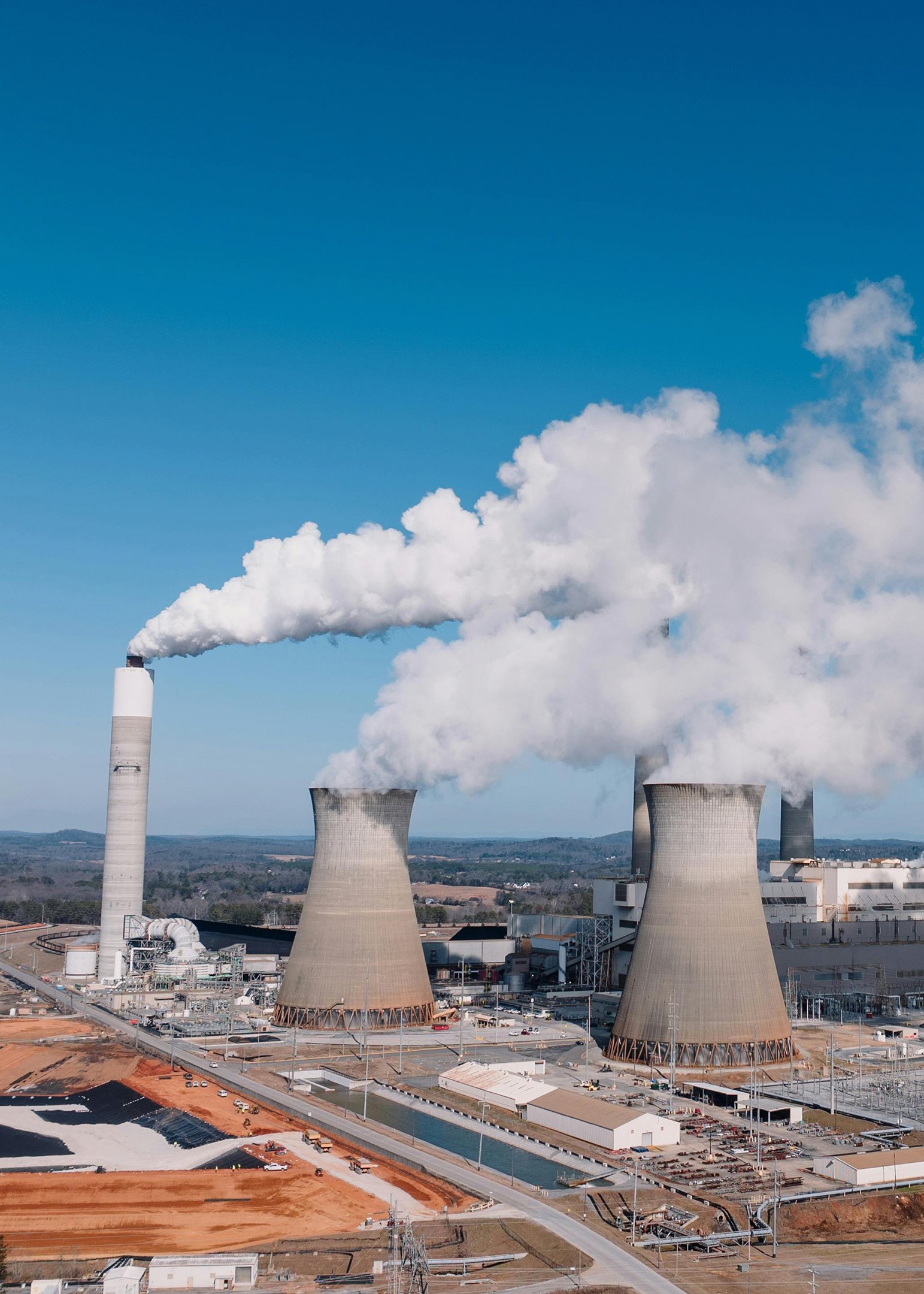Master of Science in Climate and Energy Policy

The Master of Science in Climate and Energy Policy (MSCEP) at the Harris School of Public Policy is a one-year, full-time graduate program designed to train future leaders at the intersection of climate science, energy technology, data science, economics, and public policy.
Developed in partnership with the University’s Institute for Climate and Sustainable Growth, the MSCEP curriculum provides students with a holistic understanding of the climate and energy challenge, rigorous training in applying data and evidence to policy design, and opportunities to learn and apply skills outside the classroom. This approach equips graduates with the analytical tools, interdisciplinary perspectives, and intellectual rigor needed to craft serious solutions.

What distinguishes the Harris MS in Climate and Energy Policy is its principled approach to social science, grounded in an understanding of the underlying science and technology. We prepare students to operate at the intersection of data science, economics, and policy design—equipping them with the analytical tools, interdisciplinary perspective, and intellectual rigor needed to craft serious solutions to the global climate and energy challenge.
Ryan Kellogg
Rigorous Curriculum
Real-World Experience
The curriculum is anchored in data science, economics and policy, and blends academic rigor with applied learning, ensuring you graduate ready to lead.
Core Coursework | Build Your Foundation
Gain the analytical, scientific, and technical skills to lead in climate and energy policy from day one.
Experiential Learning | Go Beyond the Classroom.
Dive into a hands-on module where you’ll explore how real communities, organizations, and governments navigate climate and energy challenges to gain an authentic understanding.
Capstone | Collaborate. Integrate. Solve.
Work on a real-world climate or energy challenge, combining your skills in policy, economics, and technology to deliver practical solutions.
Electives | Customize Your Path. Deepen Your Expertise.
Choose courses from machine learning to utility regulation to shape your focus and sharpen your skills.

Core Domains
Career-Ready Skills
The 11-month program provides a 360-degree understanding of the climate and energy challenge with a strong foundation in quantitative analysis, climate science, economics, and energy policy, progressing from fundamental data skills to advanced policy applications. The curriculum is anchored in 4 core domains and blends academic rigor with applied learning, ensuring students graduate ready to develop solutions that are scientifically informed, economically sound, and politically feasible.
Data & Analytical Tools
Statistics, programming, data visualization, machine learning, program evaluation
Economics & Policy Analysis
Climate economics, energy markets, regulatory policy, cost-benefit analysis
Climate Science & Systems
Earth systems science, climate modeling, carbon cycle dynamics, climate attribution
Energy Technology & Innovation
Grid decarbonization, electrification, carbon capture, storage, renewable integration, geoengineering, nuclear, emerging technologies
Sample Schedule
Sample Schedule |
|||
| Summer | Fall | Winter | Spring |
| Data and Programming for Climate and Energy Policy | Energy and Environmental Markets | Foundations of Climate Science | Climate and Energy Policy Evaluation |
| Data Analytics and Visualization for Climate and Energy Policy | Data and Statistics for Climate and Energy Impact Analysis | Climate and Energy Technology | Capstone Project |
| Climate Economics and Energy Systems | Elective | Elective | Elective |
Course Descriptions
Summer
- PPHA 49901 Data and Programming for Climate and Energy Policy
This course introduces students to principles for writing code in Python that efficiently ingests, manages, and characterizes climate and energy datasets. An emphasis is on developing good practices that ensure replicability and facilitate collaboration, and that are applicable across programming languages. Skills will be developed using real-world applications that involve climate and energy data. - PPHA 49902 Data Analytics and Visualization for Climate and Energy Policy
This course builds on “Data and Programming for Climate and Energy Policy” by developing students’ skills in data analysis and visualization, using Python. Topics will include the handling of “messy” real-world data, static and dynamic data visualization, spatial data analysis, and the production of high-quality reports. - PPHA 49903 Climate Economics and Energy Systems
The global energy and climate challenge requires identifying approaches to ensure people have access to the inexpensive and reliable energy critical for human development, without causing disruptive climate change or unduly compromising health and the environment. The course pairs technical and economic analysis to develop an understanding of policy challenges in this area. Topics will include the past, present, and future of energy supply and demand; global climate change; air pollution and its health consequences; selected energy technologies such as solar photovoltaics, nuclear power, and unconventional oil and gas; and an analysis of theoretical and practical policy solutions in developed and emerging economies.
Autumn
- PPHA 49904 Energy and Environmental Markets
The production, distribution, and consumption of energy is frequently organized via economic markets. How do these markets operate, and what are their consequences for energy producers and consumers? How do they provide incentives or disincentives for the development and deployment of new energy technologies? What are rationales for government intervention into energy markets, and why are some markets more heavily regulated than others? Finally, how might lessons from markets for energy and other goods be applied to understand emerging markets for environmental goods, such as pollution emission permits, carbon offsets, and other tradable environmental credits? - PPHA 49905 Data and Statistics for Climate and Energy Impact Analysis
This course aims to provide a foundation in statistical analysis, as employed for quantitative evaluation of the impacts of climate change and energy use on humans and the environment. Fundamental to understanding and using statistical analysis is the realization that data do not emerge perfect and fully formed from a vacuum. An appreciation of the provenance of the data, the way they were collected, and why they were collected, is necessary for effective analysis. Statistical concepts will be illustrated through mini-projects and applications that use real-world climate and energy data.
Winter
- PPHA 49906 Foundations of Climate Science
This course introduces the basic physics governing the Earth’s climate. Topics include atmospheric thermodynamics, the hydrological cycle, the basic principles of radiation balance, and diurnal and seasonal cycles. Students solve problems of increasing complexity, moving from pencil-and-paper problems to programming exercises, to determine surface and atmospheric temperatures and how they evolve. - PPHA 49907 Climate and Energy Technology
This course covers the broad range of physics and technology topics that are at the heart of current local and national policy debates. The aim of the course will be to give students tools for distinguishing between sense and nonsense when confronted by technology-based arguments. Course topics will include the generation, distribution, and use of energy; emissions control technologies; and climate systems engineering.
Spring
- PPHA 49908 Climate and Energy Policy Evaluation
The goal of the class is to familiarize students with the principles and methods of program and policy evaluation. The lectures will cover a mix of theory and applications; the problem sets will involve extensive data analysis and a fair bit of coding, all within the context of climate and energy policy. The objective is for students to be able to evaluate policy evaluation reports written by others and carry out policy evaluations themselves. - PPHA 49909 Capstone Project
In their Capstone Project, students will work under faculty supervision to apply their training to help address a specific climate and energy policy challenge. Students will serve as policy consultants, working in teams to conduct research, analyze complex data, and engage with clients and other experts to produce a set of solution-oriented final deliverables. In addition to gaining first-hand experience on a specific issue, students hone other skills that prepare them for policy careers, such as working with imperfect data, navigating team dynamics, and communicating complex analyses and policy recommendations to decision-makers.
Degree Requirements
To complete the MSCEP degree requirements, students in the one-year program must:
- Successfully complete 12 graduate-level courses (1200 units of credit)
- Complete all nine core (required) courses with a C- or better
- Complete the experiential learning requirement
- Have a cumulative grade point average of at least 2.7 at the time of graduation
- No more than one course can be taken Pass/Fail. Core (required) courses must be taken for a letter grade
- Courses with grades of F, I, W, or with no reported grade do not apply toward the 12-course requirement for the program.
Policies on the results of not meeting these requirements can be found on the Harris policies page.
Any questions about these requirements can be sent to the Harris Dean of Students Office at harrisdeanofstudents@uchicago.edu.
Chicago Curriculum
Recognizing both the critical nature and complexity of the climate and growth challenge, the University of Chicago formed the Chicago Curriculum on Climate and Sustainable Growth—a pioneering new approach to energy and climate education led by the Institute for Climate and Sustainable Growth.
The unparalleled Chicago Curriculum recognizes that to understand the climate and sustainable growth challenge, students must grapple with its foundational elements, complexities, and tradeoffs using a 360-degree approach.
Learn more at the Institute for Climate and Sustainable Growth

A game change is needed in the climate fight—one that works with humanity’s aspirations for economic growth by relentlessly identifying how economics, policy, and markets can be used to pursue cheaper clean energy technologies. That’s exactly what the MSCEP is focused on addressing.”
Michael Greenstone
Master the Tools
of Climate and Energy Policy.

Global Insight
University Connections
MSCEP Students have the opportunity to connect with global stakeholders through participation in treks and major climate gatherings like the United Nations’ climate conference (COP) and CERAWeek, the “Superbowl of Energy.”
UChicago at COP
The Institute for Climate and Sustainable Growth sends a delegation of students to the annual United Nations international climate conferences (COP).
UChicago at CERAWeek
CERAWeek is recognized as the foremost annual gathering in the energy sector, rated among the top five “corporate leader conferences” worldwide.
UChicago at Climate Week
Climate Week NYC is a world-leading global climate event, bringing together leaders from the world of business, tech, politics, academia, and civil society.
Career Development
Anchored in Community
To advance students’ career opportunities, the Harris School and the Institute for Climate and Sustainable Growth support a wide range of opportunities to build lasting connections with alumni through a dedicated climate and energy alumni network.
Alumni Community
The alumni community provides those working in climate-related careers with the opportunity to network with peers and become mentors to UChicago students.
Distinguished Fellows
Through several visits over the course of an academic year, Distinguished Fellows share perspectives and expertise in a series of lectures, workshops, and public discussions, as well as serve as resources for students, faculty, and staff.
Climate & Energy Career Fair
The Climate & Energy career fair is an opportunity for students to learn about the various career paths they could take in the climate, energy and environmental sectors. It is also a chance for students to meet and network with prospective employers.

Quantitative Minds
Climate Leaders
The MSCEP is designed for individuals who are analytically minded and ready to tackle one of the most pressing challenges of our time. Whether you're already working in climate or energy and looking to deepen your policy and data skills, or you're eager to pivot into the field from another sector, this program offers a powerful launchpad.
You’re a great fit if you:
Have a strong foundation in a quantitative discipline such as economics, engineering, statistics, computer science, or the natural sciences
Are motivated by impact and want to shape practical, data-informed solutions to climate and energy challenges
Thrive in rigorous academic environments and value the precision of evidence over ideology
Seek a fast-paced, professional program that blends technical training with real-world application
Want to work across sectors—public, private, or nonprofit—to drive change
Gain Real-World Experience.
Build a Network that Lasts.
World-Class Scholars
Real-World Impact
Learn from world-renowned scholars from the Energy Policy Institute at the University of Chicago (EPIC) whose research is shaping the future of climate and energy policy. At Harris, your faculty aren’t just leading academics—they’re industry leaders tackling today’s most urgent global challenges.










Policy is serious work for serious people—and there are few issues more pressing than the global climate and energy challenge. The Harris MS in Climate and Energy Policy is designed to prepare students to confront it with analytical rigor, clarity of thought, and a deep sense of responsibility for shaping effective policy. Rooted in Harris’s core principles of open inquiry and respectful debate, the program equips students to lead across sectors with precision and purpose.”
ETHAN BUENO DE MESQUITA
Embedded in a World-Class Policy Ecosystem
As part of the Harris School of Public Policy and the Institute for Climate and Sustainable Growth, students are immersed in a professional environment shaped by the University of Chicago’s legacy of free inquiry and intellectual rigor.

